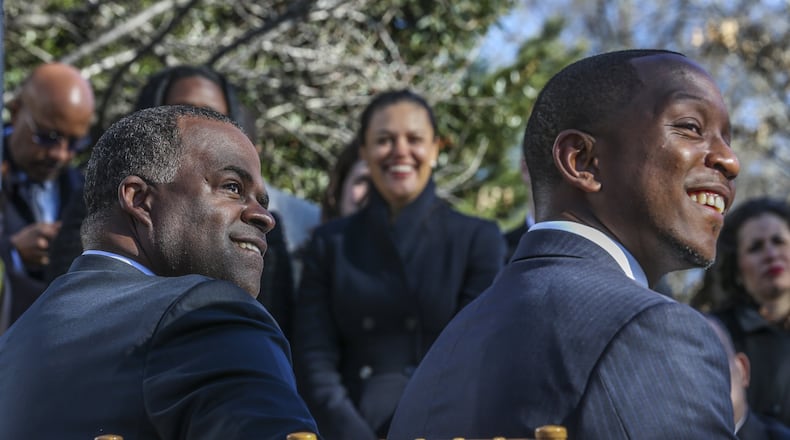A three-year legal fight over school property deeds that started under then-Mayor Kasim Reed will cost the city of Atlanta and Atlanta Public Schools more than $700,000.
The dispute is now well on its way to an out-of-court resolution under a new mayor who pledged to mend the city’s frayed relationship with the school district.
The cost to taxpayers includes attorney fees and property title research— some of which officials contend would have been required even if APS and the city had not scuffled in a Fulton County lawsuit the school district filed in March of 2015.
APS has spent about $334,000 through the end of February to obtain control of deeds to school properties from the city, while the city racked up charges of more than $400,000 — much of which was to fight the school district in court during Reed’s administration, according to interviews with officials and documents obtained through public records requests.
The conflict is wrapping up after dozens of affidavits, motions, responses, and notices. Mayor Keisha Lance Bottoms promised while campaigning in November that if she won election she would turn over the deeds. The Atlanta City Council in February agreed to transfer deeds to 31 of about 50 properties sought by APS. The city is working with the school district to finish property surveys and complete other due diligence required to transfer the remaining properties.
While they work out the remaining details, both sides asked the court to halt the case “so as not to incur any additional legal costs,” APS said in a February statement. They plan to dismiss the case once all properties are transferred.
Officials on both sides defended their actions and the attorney bills as they sparred over deeds to school properties that the city had held onto after it legally split from the school district in the 1970s.
In 2015, Atlanta schools filed a “quiet-title” petition in Fulton County Superior Court seeking to establish clear title to four properties formerly used as schools that APS wanted to sell. The city, under former Mayor Reed, had refused to turn over the deeds to the school district.
APS contends Reed’s denial forced its hand.
“The money we spent was absolutely necessary because we wanted to make sure that in whatever transactions we took in regards to those properties, we wanted to ensure that legally we owned those properties,” said school board chairman Jason Esteves. “What we did with the lawsuit and what we did with insuring that we had… clear title was to avoid those legal issues in the future. If anything it is an investment.”
About two months after the school district filed the petition against anyone who might claim title to the properties, the city hired the Atlanta law firm Bondurant Mixson and Elmore to handle its response, including a motion to dismiss the case.
In court documents, the city contended that “any notion that the action is not squarely aimed at Atlanta is untenable” and characterized the school district as being “newly unhappy and impatient with the political negotiation process that both sides have used to resolve issues about former school properties for more than 40 years.”
APS, which tapped the law firms of Strickland Brockington Lewis LLP and Nelson Mullins to handle the litigation and research, told the court the city had “routinely” granted the school system deeds to properties the district had declared surplus and wanted to sell previously. The city’s attorneys denied in court documents that the process had ever been “routine” and that the city “routinely” granted a deed for every property sought by APS.
As the school district and city locked horns, they also battled over school taxes used to develop the Beltline. In 2016, they agreed to a new deal that called for Atlanta to pay less money than previously agreed upon to APS in exchange for using some school taxes for the trail project. Officials said the new terms did more to guarantee the school district would get paid.
No action was taken to turn over the disputed deeds for nearly two years during that tussle. After the Beltline resolution, the school district renewed calls for the city to turn over deeds.
The city contested the school district’s petition for titles, as well as later court filings from APS seeking to add more disputed properties to the case.
The city’s stance on the deeds was prompted by Reed’s desire to make sure that anytime public resources are used “the public should benefit,” said Anne Torres, who served as a spokeswoman for Reed’s administration and until recently for Bottoms. Reed wanted school properties that were redeveloped into multifamily housing to include affordable units, and the school district ultimately adopted an affordable-housing policy in that vein last year.
When the school district filed the lawsuit, those policies weren’t in place, said Torres, in an interview last month.
“Everything we did, his position on this was really from the heart,” she said, of the city’s legal fight. “Mayor Reed had made the ask and APS had refused…; Mayor Reed made a steadfast commitment that this was important to him, and that’s how this initially came to be.
The city reported that it agreed to turn over deeds to the four properties in APS’ initial petition after the housing policy adoption, but the city continued to fight in court as APS attempted to add more properties to the case.
Torres said Reed declined to comment.
The city and school district’s combative relationship softened after Bottoms won election. In February, the new mayor signed over the first batch of deeds during a city hall ceremony to applause and smiles from the superintendent and school board members who attended the event.
About the Author
Keep Reading
The Latest
Featured



